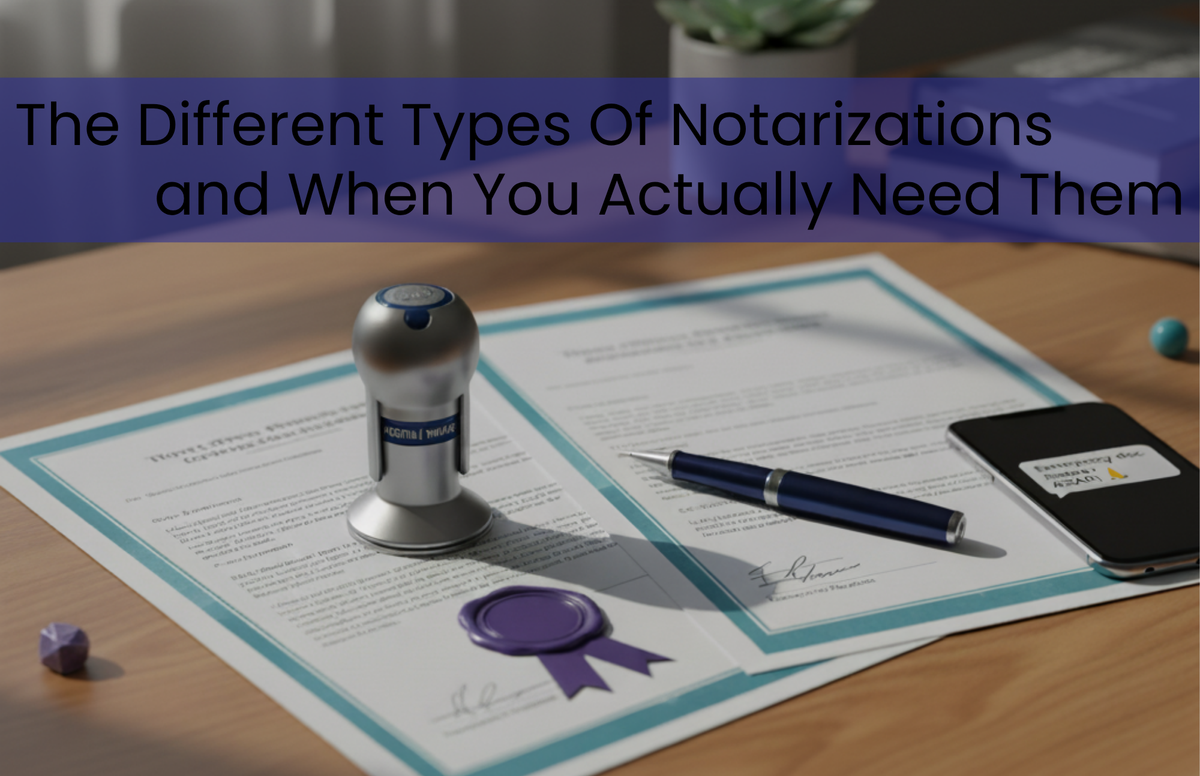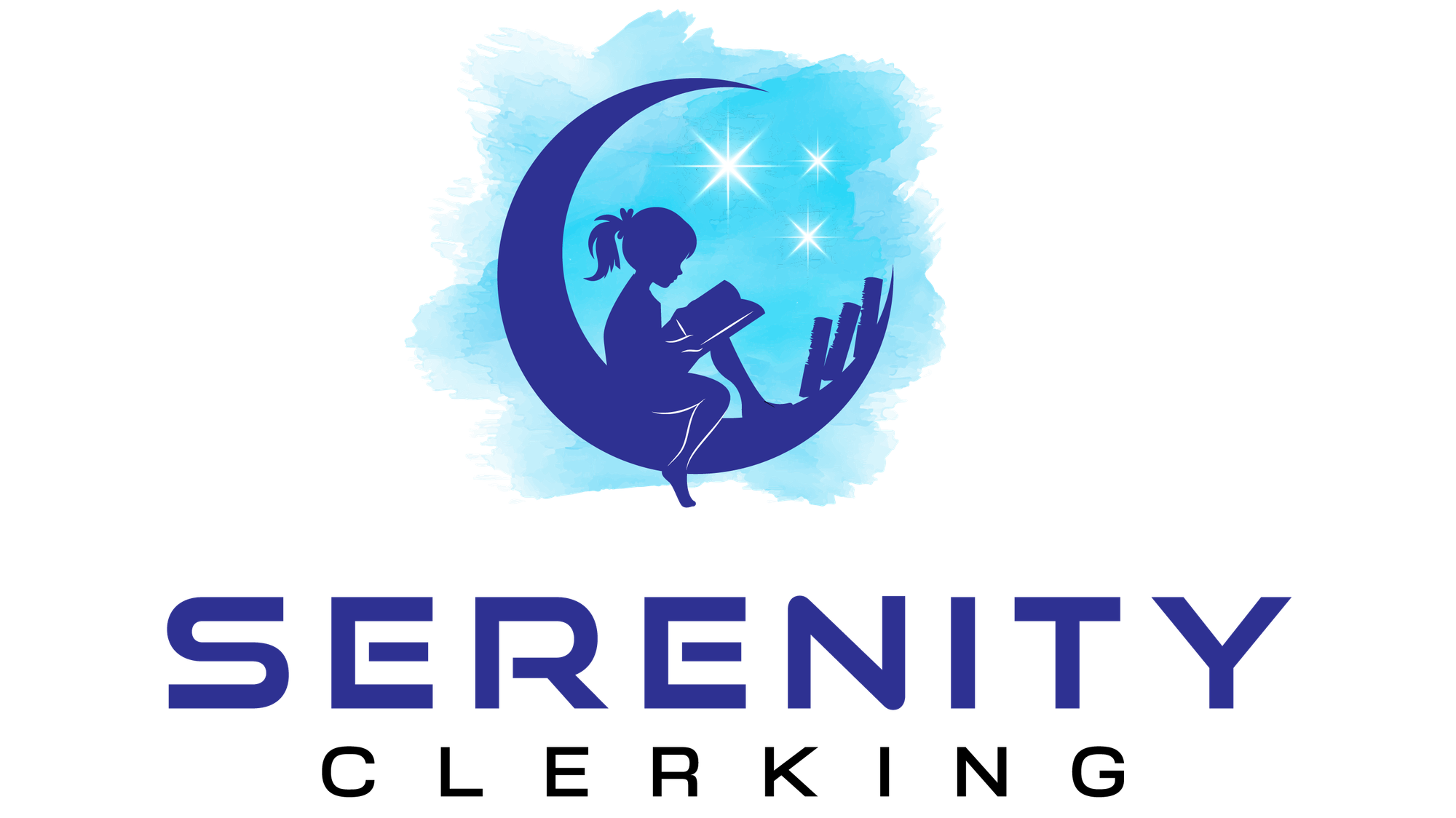The Different Types of Notarizations and When You Actually Need Them

My phone lit up at 8:30 PM on a Thursday with a text that started with "HELP!" in all caps.
A client needed three documents notarized before her mortgage closing the next morning at 10 AM. The bank had told her they required notarization, and she'd completely forgotten. Could I meet her somewhere? Anywhere?
This happens more than you'd think.
People assume all notarizations work the same way, or they don't realize they need one until they're staring at a deadline. Then they're scrambling to find someone who can help when banks are closed and panic is setting in.
I'm River from Serenity Clerking, and as a Texas Notary Public, I can tell you that most of that panic comes from one thing: not understanding what type of notarization you actually need.
Here's the good news. Once you know the three main types and when each one applies, you can plan ahead and skip that late-night scramble entirely.
(And yes, that client got her mortgage. We met at a 24-hour diner, handled all three documents in fifteen minutes, and she walked into her closing the next morning right on schedule.)
Why This Actually Matters
Here's what I've learned: the type of notarization your document needs isn't up to you.
The document itself determines it. Get it wrong, and you invalidate the entire transaction. I've shown up to help clients only to discover we'd planned for the wrong type, or that they'd already signed something they shouldn't have. When you're building a business around helping people avoid exactly these situations, you learn fast what actually works and what just creates stress.
The three types you need to know: acknowledgments, jurats, and copy certifications.
Each one serves a different legal purpose. Each one has different requirements. Let's break them down.
Acknowledgments: "Yes, I Signed This Willingly"
What it does: An acknowledgment confirms you signed a document willingly and that you are who you say you are.
The notary doesn't need to watch you sign. They just verify your identity and confirm you signed voluntarily.
When you'll see it:
- Real estate transactions (deeds, mortgage documents)
- Business formation paperwork (LLC articles, partnership agreements)
- Power of attorney documents
- Loan applications and agreements
- Business contracts over certain dollar amounts
Real example: Most of that client's mortgage documents required acknowledgments. She'd already signed them at the title company, she just needed me to verify her identity. Perfect for a 9 PM diner meeting.
(You might also see this with a power of attorney document for elderly parents, or a business partnership agreement.)
What you need:
- Valid government-issued photo ID (driver's license, passport, state ID)
- The signed document (yes, already signed is fine for acknowledgments)
What I do:
- Verify your identity
- Confirm you signed the document willingly
- Complete the acknowledgment certificate
- Apply my official seal
Key point: You can sign the document before we meet, as long as you're prepared to confirm you signed it voluntarily. This is the only type where pre-signing works.
Jurats: "I Swear This Information Is True"
What it does: A jurat requires you to swear or affirm that the contents of a document are true.
Here's the key difference: I have to watch you sign the document. You're making a legally binding oath about the truthfulness of what you've written. That's why pre-signing isn't allowed.
When you'll see it:
- Affidavits (sworn statements of fact)
- Depositions and sworn testimony
- Financial statements under oath (for court cases or major transactions)
- Insurance claims requiring sworn statements
- Certain business registration documents
Real example: A contractor client needed a sworn affidavit for an insurance dispute. This required a jurat because he was swearing under oath that his statement was accurate. We had to meet so I could watch him sign it and administer the oath. No way around that requirement.
What you need:
- Valid government-issued photo ID
- The document, unsigned
- Complete understanding of what you're swearing to
What I do:
- Verify your identity
- Administer an oath or affirmation (you must respond verbally...a nod doesn't count)
- Watch you sign the document
- Complete the jurat certificate
- Apply my official seal
Critical difference: You cannot sign the document ahead of time. I must witness your signature, and you're swearing the contents are true. That's a serious legal obligation.
Copy Certifications: "This Copy Matches the Original"
What it does: Copy certification confirms that a photocopy is a true and accurate copy of an original document.
This is the least common type, but it's crucial when you need certified copies for official purposes.
When you'll see it:
- Academic transcripts for professional licensing
- Corporate bylaws for business registration
- Certain contracts where copies need official validation
- Personal documents for immigration or international business
Real example: A client needed certified copies of her LLC formation documents for a potential business partner who required proof of registration. Since these weren't public records, I could certify them by comparing her copies to the originals.
Important Texas limitation: Texas law doesn't allow notaries to certify vital records (birth certificates, death certificates, marriage certificates). Only the issuing office can do that.
What you need:
- The original document
- The photocopy you want certified
- Valid government-issued photo ID
What I do:
- Compare the copy to the original
- Confirm they're identical
- Complete the copy certification
- Apply my official seal to the copy
How to Tell What Type You Need
The document tells you what's required. Look for specific language.
Acknowledgment language looks like this:
- "State of Texas, County of ______"
- "On this day personally appeared before me..."
- "...who proved to me on the basis of satisfactory evidence to be the person whose name is subscribed..."
Jurat language looks like this:
- "Subscribed and sworn to before me..."
- "...who being duly sworn deposes and says..."
- "I swear (or affirm) that the foregoing is true and correct..."
Copy certification language looks like this:
- "I certify that this is a true and correct copy..."
- "State of Texas, County of ______, I, [Notary Name], do hereby certify..."
Still not sure? Call the organization requesting the notarization. Banks, attorneys, government agencies, they can tell you exactly what type they need. Don't guess. Getting it wrong means starting over with a fresh document.
Not sure which type your documents need? That's where a Granbury mobile notary can help. I can review your paperwork before we meet so you don't waste time or make costly mistakes.
Why Mobile Notary Service Makes Sense
From working with clients in various "notary emergency" situations, I've seen why mobile service works for busy people.
Timing flexibility: That client with the mortgage documents couldn't meet during business hours. We handled everything over coffee after her work day ended.
Location convenience: I've notarized documents in offices, living rooms, coffee shops, and that memorable 24-hour diner. The key is finding a neutral location where everyone feels comfortable.
Document review ahead of time: I always ask to see the documents first, so I can confirm the required notarial act (acknowledgment, jurat, etc.) and what you should prepare.
No rushing: Unlike a busy bank or shipping store, mobile notary service means taking time to ensure everything's done correctly the first time.
Learning opportunity: Since I'm not rushing to serve the next person in line, there's time to explain what's happening and why. That helps you prepare better for future notarizations.
Preparing for Your Notarization
Before I arrive:
- Don't sign documents requiring jurats (sworn statements/affidavits)
- Do sign documents requiring acknowledgments (contracts, deeds)
- Have your ID ready (current, government-issued photo ID)
- Read through documents so you understand what you're signing or swearing to
- Gather original documents if you need copy certifications
Questions to ask yourself:
- Am I swearing that information is true, or just confirming my identity?
- Do I need to sign in front of the notary, or can this be pre-signed?
- Are there multiple documents requiring different types of notarization?
Red flags that mean you should wait:
- You don't understand what you're signing
- You're being pressured to sign something immediately
- The document has blank spaces that should be filled in
- You don't have proper identification
Mobile Notary vs. Going to a Bank
Choose DFW mobile notary services when:
- You have multiple documents requiring different notarization types
- You need service outside normal business hours
- Time is critical (loan closings, court deadlines)
- You want document review before signing
- You have mobility limitations
Bank or UPS store works when:
- You have a simple, single acknowledgment
- Standard business hours work for your schedule
- Cost is the primary concern
Mistakes I've Seen (And How to Avoid Them)
The most common issues I've encountered with Weatherford and Granbury notarizations:
Pre-signing jurat documents: One client signed an affidavit before we met. That meant getting a fresh document since I needed to witness the signature. Frustrating for everyone.
Expired ID: Texas law is specific… current, government-issued photo identification required. "Close enough" doesn't work here.
Not reading the document: Especially critical for jurats where you're swearing information is true. If you're not comfortable making that oath, don't sign it.
Incomplete paperwork: All relevant blanks must be filled before notarization. I can't notarize a document with empty spaces.
Want the complete mistake-prevention checklist? Download the free Notarization Quick Reference Guide below. It includes preparation steps, ID requirements, and a decision tree for choosing the right service.
Your Next Steps
Now that you understand the three types of notarizations, you can identify what your documents require, prepare properly, and save yourself time and stress.
Remember: the document determines the type of notarization needed. When in doubt, ask the requesting organization for clarification rather than guessing.
I'm expanding my mobile notary services to serve Granbury and DFW area business owners. Whether it's a planned business transaction or a last-minute closing emergency, I can meet you at your office, home, or any convenient location.
Ready to avoid the late-night notary scramble? Download your free guide and never wonder which type of notarization you need again.
Prefer to download directly? [Click here for immediate access] This can help you get clarity on the type of notarization you need and could save you stress.
Questions about your specific documents? Book a free 15-minute consultation to discuss your needs and see how mobile notary services can save you time and stress.
[Schedule Your Free Consultation]
River provides mobile notary services throughout Granbury, Weatherford, and the DFW area. As a QuickBooks specialist, she understands the business documents that often require notarization and can help ensure your financial and legal paperwork is handled correctly the first time.
